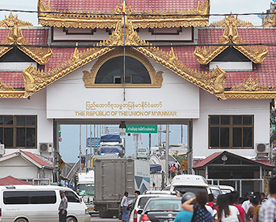Most consumer goods, especially prepared foods like instant coffee and condiments and consumer goods, which are used by the middle class of Myanmar, are imported from Thailand. Myanmar represents 4 per cent of Thailand’s total food exports. In total, there are 16 border trade gates with Myanmar’s neighbouring countries. Out of all 16 border trade gates, there are 4 borders; Tachileik, Myawaddy, Kawthaung and Myeik over Myanmar – Thailand Border Area. After Muse gate, Myawaddy ranks number two for trade value. Both Myawaddy and Maesot are border towns but the situations are quite different. The official Thai census estimates 106,000 migrant workers living in Mae Sot and most of them are from Myanmar.
One of the main reason to prefer to work in Maesot rather than Myawaddy is salary. While the Myanmar minimum daily wage is still stable at 3,600 Kyats from 2015 to date, minimum daily wages in Thailand increased to 12,200 Kyats (305 THB) in 2017 from 120,00 Kyats (300 THB) in 2016.
According to the International Organisation for Migration, over 3 million Myanmar work and live in Thailand. Up to 70 per cent of migrants living abroad are based in Thailand. In the first three months of this year, 35,563 Myanmar migrants went to Thailand, according to official estimates. After Thingyan holidays 2017, over 9,000 migrants returned. Over 60 per cent were male.
Myanmar could not provide enough job opportunities. Already there are an estimated 200 factories operating in the area, many of which employ workers from Myanmar, both legally and illegally.
Thant Zin Aung, National League for Democracy member, said “Farmers in Kayin State grow Corn and paddy. There is a lack of demand. The regional minister of state discussed with stakeholders from respective sectors, hoping to create more job opportunities. We have to take loans from Thailand to farm and buy machinery. We then sell back to Thailand because we do not have any market. We need to produce value added products. We need to improve our infrastructure such as electricity, transportation etc. Literally, we can say Myawaddy is completely dependent on Thailand.
Thant Zin Aung, National League for Democracy member, said “Farmers in Kayin State grow Corn and paddy. There is a lack of demand. The regional minister of state discussed with stakeholders from respective sectors, hoping to create more job opportunities. We have to take loans from Thailand to farm and buy machinery. We then sell back to Thailand because we do not have any market. We need to produce value added products. We need to improve our infrastructure such as electricity, transportation etc. Literally, we can say Myawaddy is completely dependent on Thailand.
A 201-acre Myawaddy industrial zone, just 7 miles from the Thai-Myanmar border, is under development in Kayin State and is expected to open this year. There are delays in opening the special economic zone near the Myawaddy border due to limited electricity and investment. Currently, Myawaddy buy electricity from the Thai-based company PEA. Household users pay 2.6 Baht for 1 unit and Industrial users pay 6 Baht for 1 unit.
He also mentioned illegal trade. Illegal or low quality standard products are smuggled through the borders and there have been some complaints regarding the lack of quality of local products.
Thant Zin Aung added “We should negotiate with merchants, stop taking a long time at the border gate, give the green light to some restricted items which we need, relax some policies of trade such as documentation. If merchant would choose the legal gate to trade, the government could enjoy the right amount of taxation on trade.”
The peace and stability of the state is directly linked to the economy. There are 24 illegal impromptu checkpoints set up by ethnic militia.
A Myawaddy resident and local restaurant owner said, “Now, we have to buy not only consumer goods but also food products including cucumber and mango. We let our staff buy in Maesot weekly because it is cheaper than in Myanmar. Can’t we grow in Myanmar? Yes, We can. But why don’t we? Because we can’t get what we give or don’t pay off our effort. Young people stop working their family business farming and go to Thailand for work on farms or in factories.” Thin Thin Myat, Chairperson of the Myanmar Trade Border Association, said “Around 8:00 am, we can see a queue of people waiting to go through the Friendship bridge to go to work. Starting from fifteen year olds, most of them are young people. We can’t say don’t go and work here. To prevent losing human resources, we must create job opportunities, such as establishing more factories as well as industries. Moreover, we must try to improve our average minimum wages.”
From morning until night, money is draining into Thailand. The major export products of Myanmar are commodities such as natural gas, wood products, jade and gems. Few are value added products. Myanmar has to depend on other neighbor countries for value added products. The government needs to encourage local businesses to come up with new export items, it seems.
According to the Ministry of Industry, there are more than 120,000 SMEs (small and medium enterprises) across the country, which account for 99 per cent of the Myanmar economy. However, the sector has been hampered by a lack of access to finance, partly because of restrictive collateral requirements, but also because of a lack of capacity among local banks to assess and manage operational and credit risks for smaller businesses. Even though entrepreneurs have an idea of how to start a business they can’t do it. Currently, loans are being offered to the SME sector by the state-owned SME Development Bank. Only a very small amount is given by local private banks. SMEs in Thailand are favoured by the Government. The rate for SME loans in Thailand is only 1.3 per cent while it is 13 per cent in Myanmar.
Myawaddy, though, is going to have its own electricity, according to the MP of Kayin State Hluttaw. In the meantime, the Myawaddy Industrial zone is under construction and expected to open this year, according to officials. In addition, the dry port is being implemented in cooperation with the Japan International Cooperation Agency (JICA). The manufacture sector is going to open up. Myawaddy can boost the volume of exports and job opportunities will open up for local residents.










